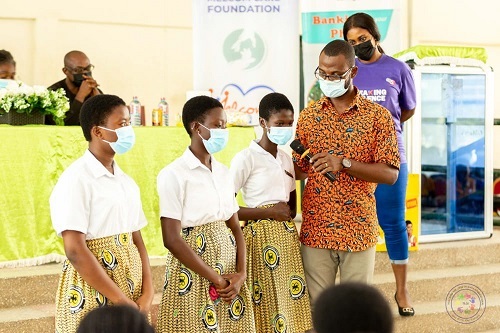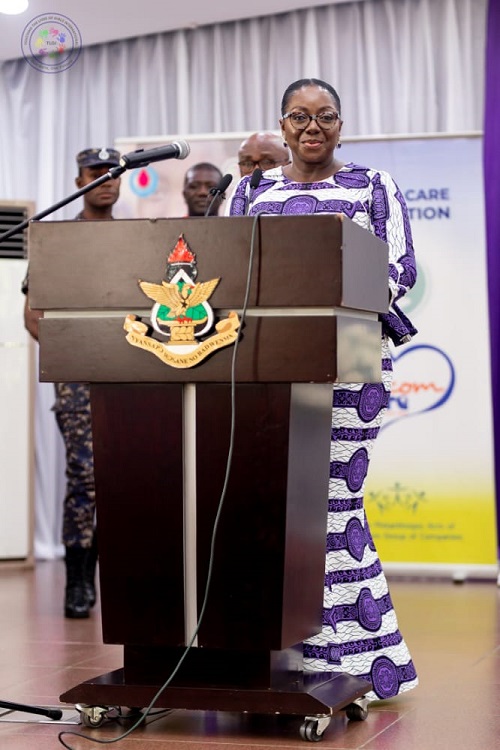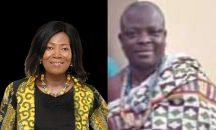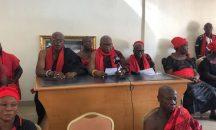Demystifying menstruation and empowering girls – Nana Ama Adutwumwaa’s journey

Five years ago, Nana Ama Adutwumwaa started a journey to demystify menstruation and empower young girls.
With her “Touching the Lives of Girls Foundation” the focus was to spearhead a campaign to demystify the “taboos” surrounding menstruation and also provide sanitary towels to young girls.

Her passion for feminine hygiene issues was borne out of a personal experience she encountered a few years before starting her advocacy.
She recounts that she nearly lost her live following a severe pelvic infection which spread to her ovaries.
According to doctors who performed surgeries on her, the growth was a result of years of improper hygiene practices and so when she recovered she started the advocacy to share her journey while preaching proper hygiene practices.
As the foundation marks its fifth anniversary this year, Ms Adutwumwaa says she is grateful to the partners who have supported her, traditional leaders and opinion leaders for their support and contributions and schools across the country for opening their doors
“I have lost count of the number of schools and communities we have visited within this five-year period but the feedback and connection we have created with the girls, teachers and community leaders is amazing. “she said.
She said her outfit did not only embark on these campaigns on May 28 when World Menstrual Hygiene Day is observed but organises talks throughout the year saying, “In May we join the world to mark the day but the topic is a very relevant one which must be discussed all year round. This is why we continue to educate girls especially in schools out of Accra on the importance of proper hygiene.”
To make the campaign effective, Ms Adutwumwaa includes traditional leaders and other opinion leaders from different religious backgrounds to add their voice to the campaign.
She said they have chosen this approach because most of the taboos are deep rooted in certain cultures and religious settings and getting the leaders involved is a way of ensuring that the whole community is involved in the change the foundation wants to see.

Also, although the campaign is targeted at young girls, male students and teachers are not excluded. They are also involved in the education so they understand that menstruation is a natural occurrence
“In some rural areas, there are days some girls menstruating refuse to go to school because they are shy of soiling themselves and being ridiculed by their male classmates. We involve the boys so they do not make fun of girls who accidentally soil themselves. Some of these girls also cannot confide in their parents or caregivers when they start menstruating and it is the teachers who they speak to. This is one of the reasons we include the male teachers so they can guide the girls if need be, “she explained.
Ms Adutwumwaa said till date, some girls hide their menarche (first menstrual period) from their mothers or guardians till they are caught with blood stains.

Most of them therefore use toilet rolls and other unhygienic papers and clothes and do not take good care of themselves which exposes them to life threatening infections’
“In my case for instance, I got the infection from years of using toilet roll. I think little pieces of the paper gathered over time and escalated into a serious health condition. This is why I am so passionate about this cause. There are days we travel long hours to reach some communities and are tempted to give up but we continue because we know what we do is important in the lives of girls and the communities as a whole
“Some of the materials some girls use during their menstruation will shock you. Talk of rags, plantain leaves, cotton, old newspapers and other materials which predisposes them to infections. Thankfully, after our talks we are able to distribute some sanitary towels to them and teach them how to use them properly, “she explained
Touching on funding, she said although she had personally invested a lot of money into the project in the last five years, a number of organisations and individuals have contributed immensely towards its success.
She expressed gratitude to the National Lottery Authority (NLA), Melcom Care Foundation, Eximbank Ghana, Donewell Insurance, Guinness Ghana, Fidelity Bank and Opportunity International.
She also acknowledged the wife of Lady Julia Osei Tutu, the wife of Asantehene Otumfuo Osei Tutu, the Patron of the foundation and Nana Ama Agyekum Kufuor, Co-Founder for their direction and counsel over the period.
Other members on her team include Dr John K. Bosomtwe, anobstetrician-gynecologist;Akosua Biama Aboagye, chief financial officer; Regina Akosua Frimpong, organiser and Godwin Ziorkli, in charge of digital media.

“There are many instances when team members had to put resources together to support one of our talks or buy sanitary pads. I can’t underestimate their support to the success of this project. On days when I breakdown due to lack of funding or other logistic challenges, they step in and take charge.”
Asked what her plans are for the future, Ms Adutwumwaa said she was hoping to secure more sponsorships locally and internationally to extend the project to other communities especially, remote areas.
“In the last five years, we have reached out to many communities across the country but there is more we can do if we have the support. Usually, on our visits, we distribute sanitary towels and leave some for the schools. We receive calls from teachers requesting for more and there are also calls from other places we have not been to at all.
“I am appealing to organisations and benevolent individuals to support us keep girls in school. The importance of education cannot be underestimated and we wouldn’t want girls to miss out because they are menstruating,” she noted.
Background
Ms Adutwumwaa had her basic education at the Golden Child School at Nii Boye Town, Accra before moving to Nifa Senior High School at Adukrom in the Eastern Region.
After SHS, she gained admission to the Central University College where she studied Human Resource Management.
She later enrolled at the Ghana Institute of Journalism for short courses in Event Management and Marketing.
Due to the intense nature of her advocacy work, she resigned from corporate world to fully focus on the foundation.













